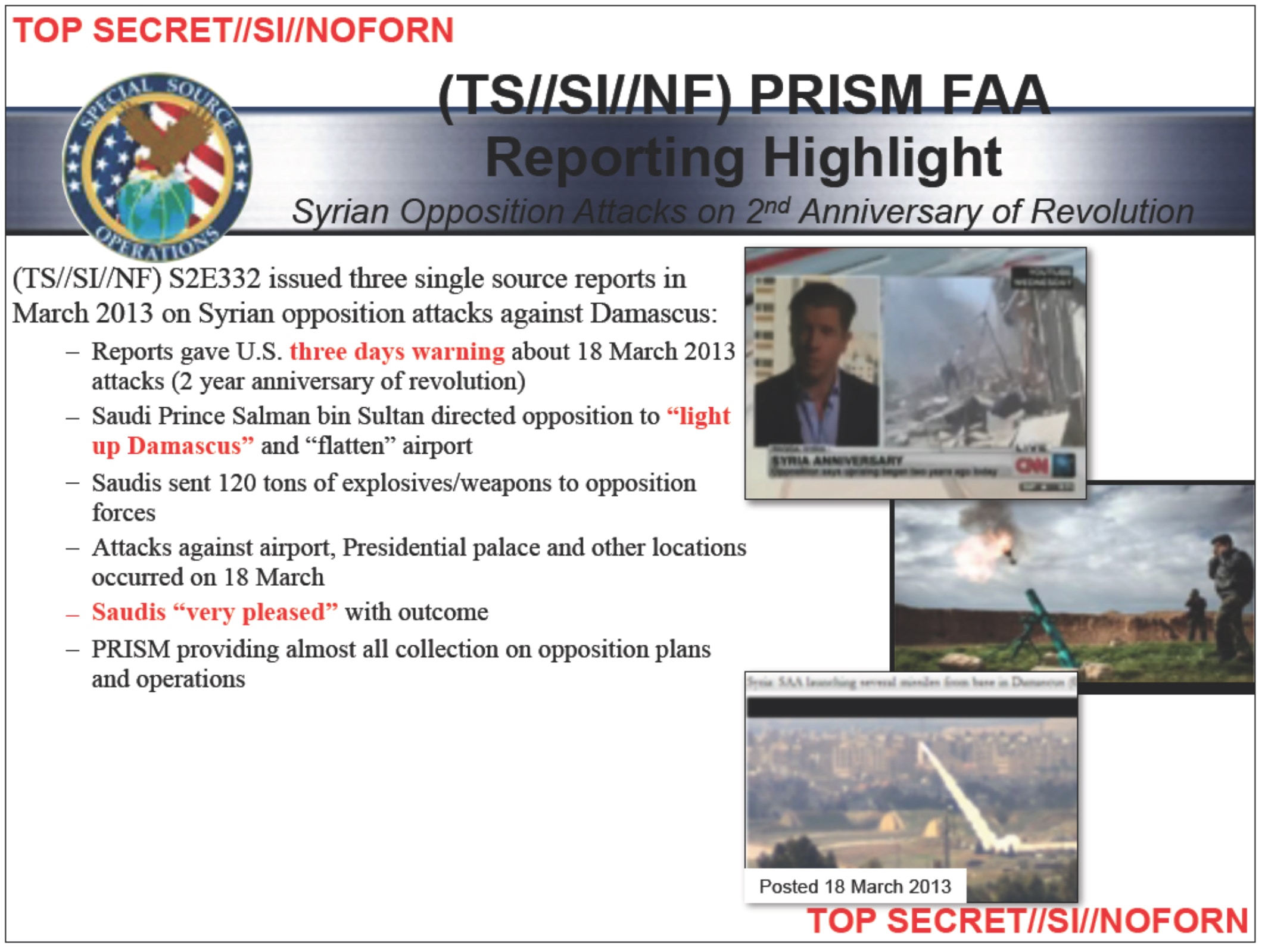The Intercept Withheld NSA Doc That May Have Altered Course Of Syrian War
If this document had been published sooner, it could have dramatically changed the course of the war by exposing the true face of the “moderate rebels” — and potentially saved tens of thousands of lives. That didn’t happen, and no reason has been given by the Intercept for its delay.
The document explicitly reveals that an attack led by the Free Syrian Army (FSA), which was intended to mark the anniversary of the 2011 “uprising” that sparked the Syrian conflict, was directed by a Saudi prince. The document proves, in essence, that the armed opposition in Syria – from the earlier years of the conflict – was under the direct command of foreign governments pushing for regime change.

An NSA graphic released by The Intercept outlines Saudi involvement in organizing and supplying Syrian opposition forces for attacks on Syria’s civilian infrastructure.
According to the document, Saudi Prince Salman bin Sultan had ordered the FSA to “light up Damascus” and “flatten” the city’s civilian airport. The Saudis had also “sent 120 tons of explosives/weapons to opposition forces” for the operation. The Saudis, as the document notes, were “very pleased” with the outcome, which claimed at least 60 lives.
The implications of the NSA document are significant. It offers the clearest proof, in the form of official U.S. government documents, detailing the direct relationship between the armed Syrian opposition and foreign governments, and exposing the fact that this relationship existed much earlier than the mainstream narrative on the conflict had previously suggested.
However, the Intercept article regarding the document is unusual for several reasons. First, the report inaccurately claims that the attack launched at the Saudis’ behest did not result in any confirmed casualties. Second, it states that the 2011 uprising in Syria was an organic, “peaceful” movement that led the Syrian government to wage “an open war against their own people” — a narrative that has since been debunked.
Yet, the largest oversight of all is the article’s failure to mention the U.S.’ role in funding the Free Syrian Army, as well as the CIA’s well-documented role in training the FSA and pumping tons of weapons into Syria in order to foment and exacerbate the conflict in its early days. In light of the NSA document’s revelation that the U.S. had been given advance notice of the planned FSA attack – on a civilian target, no less – Washington’s decision to let it proceed clearly suggests that the U.S. was involved in and well aware of the Saudi directives to the FSA. However, the Intercept piece chooses not to mention this crucial context.
Intercept’s three-plus year delay in releasing document

Free Syrian Army fighters clean their weapons and check ammunition at their base on the outskirts of Aleppo, Syria Nov. 14, 2012. (AP/Khalil Hamra)
Perhaps even more troubling than the article’s failure to mention the CIA’s well-documented role in backing the Free Syrian Army, now exposed as a proxy force following orders from the Saudi royal family, is the fact that the Intercept had access to this document for nearly three-and-a-half years – deciding to publish only now that the Syrian conflict is effectively over and those pushing for regime change have lost. If this document had been published sooner, it could have dramatically changed the course of the war by exposing the true face of the “moderate rebels” — and potentially saved tens of thousands of lives.
That didn’t happen, however, and no reason has been given by the publication for its notable delay. The Intercept has exclusive publishing rights and an exclusive hold on the content of the Snowden leaks, of which this newly released document is a part. Indeed, the Intercept was founded after the Snowden leaks were made public and its first hires were Glenn Greenwald and Lauren Poitras, the only journalists possessing the full Snowden cache. Those documents now belong to the Intercept’s founder — billionaire eBay founder, — and his for-profit media company, First Look Media.
Examining Omidyar’s connections to the U.S. political establishment offers a plausible reason for the Intercept’s delay in publishing documents so crucial to understanding the situation in Syria. Omidyar was a frequent guest of the Obama White House from 2009 to 2013, garnering more face-to-face visits with Obama during his two terms than did Google’s Eric Schmidt, Facebook’s Mark Zuckerberg, New York Times owner Arthur Sulzberger and even fellow tech billionaire turned major media owner, Jeff Bezos.
Omidyar also directly co-invested with the U.S. State Department, via USAID and the National Endowment for Democracy (NED), in opposition groups that played a key role in overthrowing Ukraine’s democratically elected government in 2014 – a U.S.-brokered regime-change operation that shares some notable similarities with the Syrian conflict. His investments with USAID have continuedsince the Intercept’s founding, helping fund the NGO’s more recent overseas programs aimed at “advancing U.S. national security interests” abroad.
Also worth noting is the fact that PayPal, of which Omidyar is a major owner, has allegedly been implicated in several of the still-withheld NSA documents for its business relationship with the NSA and its role in the agency’s mass spying program. In addition, former Intercept writers have asserted that Omidyar was “shockingly disinterested in the actual journalism” of the paper, suggesting that the Intercept was created explicitly to delay the release of damaging documents from the Snowden cache until deemed acceptable to the U.S. political establishment and others who stood to lose face were the entire cache to have been made public.
Indeed, another interesting coincidence supporting this thesis is the fact that the Intercept published this latest piece only after the U.S. State Department itself began to report more honestly on the nature of these so-called “rebels.” A day before the Intercept’s story on Syrian “rebels” and the Saudis, the U.S. State Department – for the first time – admitted that “moderate” rebels in Syria had previously used chemical weapons, a charge it had categorically denied for years in order to facilitate laying the blame for any and all chemical weapons attacks in Syria on the Syrian government.
In other words, the Intercept released the document, which effectively destroys Washington’s “moderate rebels” narrative with its own internal documents, only after the U.S. government itself began to unravel that very same narrative.
The Intercept did not respond to MintPress News’ request for comment regarding the timing of the document’s release.
Founder’s connections shape Intercept’s journalism
Omidyar’s connection to U.S. regime-change efforts abroad may also explain why the Intercept – until now, that is – has consistently given voice to journalists who have echoed the U.S. establishment regarding the Syrian conflict.
For instance, Murtaza Hussain – the author of this latest Intercept piece – has written numerous stories downplaying the terrorist and Wahhabist elements of the Syrian “rebels.” In the last two years, Hussain has written pieces portraying known Al-Qaeda propagandists, such as Bilal Abdul Kareem, and Al-Qaeda-linked organizations, such as the White Helmets, in an overwhelmingly positive light, failing to mention in both cases the significant evidence tying these entities to known terrorist groups. In another piece, published last August, Hussain gave voice to al-Nusra Front leadership in a lengthy interview that largely whitewashed the group’s Wahhabist leanings and links to terrorist acts in Syria.
Last September, on Twitter, Hussain asserted that Saudi Arabia’s funding of armed factions was not necessarily “good” but that “there is little to indicate they contribute to terrorism.” That last statement has been thoroughly debunked for years, but most recently by Hussain’s own piece on the newly released NSA document.
Hussain is by no means the only Intercept writer who has taken such a pro-opposition stance regarding Syria. A recent Intercept piece on Syria, published in September, committed glaring factual errors on basic facts about the war, while also mistranslating a speech given by Assad so as to link him to American white nationalists. In addition, the paper recently hired Maryam Saleh, a journalist who has called Shia Muslims “dogs” and has taken to Twitter in recent months to downplay the role of the U.S. coalition in airstrikes in Syria. She also has ties to the U.S.-financed propaganda group Kafranbel Media Center, which has close relations with the terrorist group Ahrar al-Sham.
For a paper ostensibly dedicated to “fearless, adversarial” journalism, it is strange that the Intercept gives voice to journalists who echo the U.S. position regarding the Syrian war while rarely publishing the work of journalists who have challenged prevailing Western narratives on that war — journalists who, as the Intercept itself recently revealed, have been right all along regarding the myth of the Syrian “moderate rebel.” Yet, given Omidyar’s political connections and the paper’s handling of the Snowden cache, this unfortunate decision is unsurprising.
Top photo | Syrian rebels attend a U.S. military training session in Maaret Ikhwan near Idlib, Syria during the height of the rebel offensive.
http://www.mintpressnews.com/intercept-withheld-nsa-doc-that-may-have-altered-course-of-syria-war/233757/





0 Comments:
Post a Comment
Subscribe to Post Comments [Atom]
<< Home